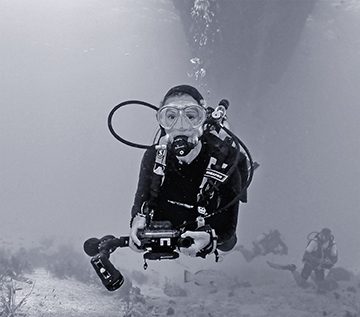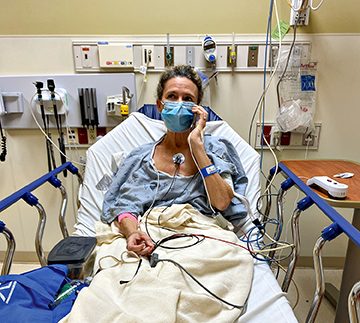

MY HUSBAND, PATRICK, and I booked a two-tank boat dive with a company in Islamorada, Florida, that offered guided dives. As we drove to the marina, I told Patrick about a friend who earlier that week had said, “I used to be a diver.”
“I wonder when I will say, ‘I used to be a diver,’” I asked rhetorically. Little did I know that hours later the answer could have been that same day.
While descending on our second dive, I was at around 60 feet when I unexpectedly started ascending rapidly to the surface. I kept my cool, rapped on my power inflator, and seemed to dislodge whatever was causing the valve to stick open. I began descending again toward Patrick, who was deeper than me at this point.
To my shock, I once again began ascending rapidly, but this time I was not feeling calm. The dive team was swimming away at the bottom of the ocean, Patrick was much farther down than I was, and I felt panic. I resumed rapping on my power inflator to dislodge whatever was sticking while simultaneously banging on my tank with a small metal 3-inch ring I wore on my wrist attached to a plastic bracelet.
I got Patrick’s attention, and when he reached me he grabbed my power inflator and rapped on it to no avail. What he didn’t know was that my buoyancy compensator was filling tightly with air, compressing my chest.
With each inspiration, my BCD became snugger. Every breath I drew from my regulator was also bringing in seawater. I didn’t know what was happening, nor did I know how to tell Patrick. I reached for his secondary regulator and took a breath in, but I forgot to purge it first. I immediately started choking and breathing in more salt water, which increased my confusion and fear. I managed to cup my hands together forming the shape of a boat to ask where the boat was because I was disoriented. Patrick pointed to a mushroom anchor attached to the buoy mooring our dive boat.
That was the last thing I remember underwater before passing out. Patrick knew he had to quickly but safely get me to the surface. To execute a controlled ascent, he raised my inflator hose to give the air incessantly filling my BCD an alternate way to escape and guided me in an unconscious ascent to the surface.
I was eventually medically cleared to dive again and have logged 120 more dives since this experience.
The next thing I remember was someone putting their arms under me to lift me out of the water, and then my awareness went blank again until I woke up lying on the deck of the boat. I was under the canopy near the front cabin, and someone had removed my face mask, BCD, and hood and pulled down my wetsuit off my arms and chest.
I immediately asked where Patrick was and learned he was safe and next to me. The crew administered oxygen, placed electrocardiogram leads, positioned me on my right side, and covered me with a solar blanket because they thought I might be in shock. They signaled for the other divers to return to the boat, though they had no idea we were not with them and what had transpired.
The crew communicated my situation and estimated arrival time to emergency medical services, who were waiting for me at the marina. In the hospital, I learned that the lack of oxygen and panic caused a demand myocardial ischemia, meaning I had a heart attack 60 feet underwater. A dive medicine specialist evaluated us and confirmed that neither Patrick nor I had decompression sickness. After spending two days in a South Miami hospital, I was sent home.
Upon reflection, I learned multiple lessons that day.
- Stay near your dive buddy. You should be able to swim to your buddy on one breath.
- Perform air-sharing techniques, and remember to purge your buddy’s regulator before using it.
- Practice for dive emergencies such as a stuck power inflator so you won’t panic in a real situation. When we panic, fear is in control. If we remain calm, we are in control.
- Know your equipment. We did not know it is OK to disconnect the low-pressure inflator hose from a BCD while underwater. Disconnecting the hose would have allowed for a controlled ascent and prevented injury to my heart.
- A guided dive does not necessarily mean a divemaster will always be in sight. Our divemaster was unaware we were not with him even though the dive plan was to remain together.
- Always carry DAN dive accident insurance. The dive operator immediately contacted a DAN medic, who gave on-the-boat care instructions on how to care for me on the way back to shore. My DAN insurance covered all expenses, supplementing my primary medical coverage. DAN also supported my recovery at home as I dealt with residual side effects and symptoms.
I was eventually medically cleared to dive again and have logged 120 more dives since this experience. When will I say, “I used to be a diver?”
Not today! AD
© Alert Diver — Q2 2023